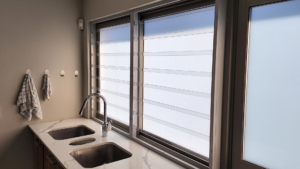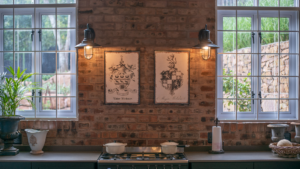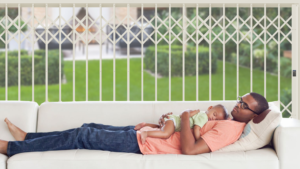Home security systems can significantly improve your home’s physical safety and bring you peace of mind as your belongings will be protected. When considering purchasing a home security system, you might not know where to start. This article will answer commonly asked questions about home security systems.
What features are included in basic and advanced home security systems?
Home security systems provide a range of features. Basic home security systems might be able to meet your security needs as they offer magnetic sensors for vulnerable entryways and infrared sensors that can detect motion inside the home. The sensors are linked to the control panel, which has a loud siren and is connected to a monitoring company that will dispatch emergency personnel if necessary.
Advanced security systems combine the essential components such as sensors and a control panel, but they also include extra crime-deterring equipment. These include glass break sensors and panic buttons for the walls, which are helpful for break-ins. Advanced security features include door locks with key codes, smartphone control and security cameras.
Are wireless or wired home security systems better?
Choosing between wired or wireless home security systems is difficult as it largely depends on your expectations. Wired security system equipment is plugged into a standard wall outlet or hardwired into a home’s electrical system, and wireless security equipment is battery operated. Wired security systems connect the sensors to the control panel using a network of wires concealed within a home’s walls and floors. In contrast, wireless security systems use sensors to communicate with the control panel using radio frequency technology.
When installing a wireless security system, you do not have to drill holes in the wall, making this an attractive option for renters. The security system is also portable and immune to power outages. The downside of wireless security systems is that they are subject to several types of interference, such as electromagnetic and structural interference, causing the sensor to respond unpredictably or fail.
On the other hand, wired security systems are not susceptible to interference, making the signals more reliable. They also require no upkeep because they do not have batteries that you may need to swap out or change. However, wired security systems require professional installation and an extra fee you will incur beyond what you have to pay for your equipment and monthly monitoring.
Should I opt for professional or DIY security system installation?
The difference between DIY and professional installation is that DIY installation is cheaper, while professional installation is easier. Professionally installed security systems will require professional monitoring and contracts, whereas DIY installed security systems have no contracts and optional self-monitoring.
With professional installation, you won’t have to do any work as a professional handles this process for you which makes it convenient. You will also have an experienced technician on site who will conduct a security assessment, ensure that the equipment works correctly, and suggest other ways to improve the security of your home. However, all these benefits will come with hefty installation fees and high equipment costs as the equipment they will provide is designed in-house.
DIY installation is a great way to save money and learn more about home security systems. The standard DIY devices are the control panel, security cameras, and base station, which means you can expect wireless equipment for your system. Using wireless equipment, you won’t have to worry about tangling wiring as you will only need to plug the equipment into a wall outlet. Unfortunately, DIY installation can be time-consuming, but this will largely depend on how large your home is.
Should I consider installing a home security system if I rent an apartment?
Whenever people think of home security systems, they will typically think of houses, but apartments are 85% more likely to be broken into than single-family houses. Therefore, you must consider installing a home security system. There are renter-friendly security systems that will provide you with an alarm system which will alert you and possibly the police if someone forcibly tries to enter your apartment.
Some packages are available with motion sensor lights or security cameras; however, you must consult with your landlord before installing security cameras. Wireless security systems are the best security option for apartments and are the cheapest option, enabling you to keep costs down.
What kinds of home security cameras are available?
There are many indoor and outdoor security camera options that you can choose from, which have full colour, high resolution and full motion. Security cameras also include night vision, allow remote monitoring and can be controlled from a mobile device or desktop computer.
Outdoor and indoor security cameras have different construction qualities as outdoor cameras can withstand harsher conditions. Some outdoor cameras are enhanced with fans and heaters to protect against the elements. Outdoor cameras should also be more durable as they are vulnerable to attempted disabling by criminals, and some homeowners choose to house their cameras in tamper-proof casings. When selecting the best security camera option for your home, you can choose from moving and fixed cameras.
How can I protect my security cameras from being hacked?
Many people rely on security cameras to watch their children and pets. However, without suitable precautions, you might be the only one who can access the footage captured by the security cameras. Luckily, it is possible to keep hackers and snoops from accessing your live feed. Firstly, start with your WiFi, as it is the gateway to all your smart devices, including your security cameras. Get into the habit of changing your WiFi password and ensure that you use complex and lengthy passwords with unique characters. Use WPA-AES encryption on all your devices, and never use the default login info for your devices.
Secondly, ensure that your security cameras have a strong digital lock and use original and complex passwords. Ensure that your security cameras have features like two-factor authentication and encryption, as they will make your live feed much safer.
Though it may be challenging not always to check your camera, leaving the camera app open all day can make the video feed vulnerable to hackers. Therefore, whenever you view footage from your home, ensure that you log out when you are done.
Lastly, you should regularly update your camera and apps as the updates include firmware improvements, which will boost security. Cyber threats constantly evolve, and you must have the right defences for your cameras and smartphones.



